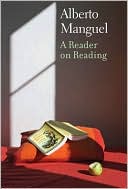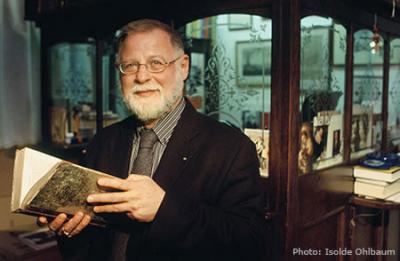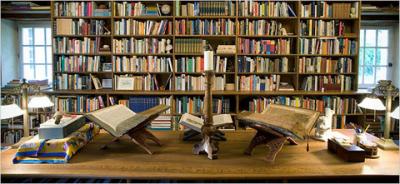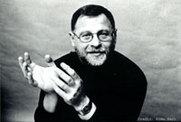Radim Kralik, the owner of Grapo Technologies, a Czech company producing wide format printers, lives in a 3,660-foot modernistic concrete box atop a converted grain silo in Olomouc, about 175 miles east of Prague. The New York Times reports that to accommodate a library inherited from his grandfather, his architects built a bookshelf that thrusts up through the two stories of the house’s open interior.
 This story would most certainly resonate with Alberto Manguel. In his essay “The Library as Home,” one of 39 collected in A Reader on Reading, he describes his own transplanted library:
This story would most certainly resonate with Alberto Manguel. In his essay “The Library as Home,” one of 39 collected in A Reader on Reading, he describes his own transplanted library:
“For the past seven years, I have lived in an old stone presbytery in France, south of the Loire Valley, in a village of fewer than ten houses. I chose the place because next to the house itself was a barn, partly town down centuries ago, large enough to accommodate my library of some thirty thousand books, assembled over six itinerant decades. I knew that once the books found their place, I would find mine.”
This is the same library that opens and dwells at the heart of The Library at Night (2006), Manguel’s brilliantly discursive book on the metaphysics and minutiae of private and public libraries. Brimming with literary anecdote, micro-histories, trivia and cameos, The Library at Night circles around its main theme: the library organizes experience according to rational and whimsical rules, and thus becomes a world unto itself.
 A Reader on Reading isn’t exactly a sequel since its range of topics is somewhat broader. Also, some of the essays were written more than 15 years ago and appeared in a previous collection, including the marvelous “Borges in Love.” While reiterating his obsessions and techniques, the essays allow Manguel to emerge as an often amusing, opinionated and even outraged narrator, effects that dispel the whiff of conventionality that may hover over a man delighted mainly by a vast variety of facts.
A Reader on Reading isn’t exactly a sequel since its range of topics is somewhat broader. Also, some of the essays were written more than 15 years ago and appeared in a previous collection, including the marvelous “Borges in Love.” While reiterating his obsessions and techniques, the essays allow Manguel to emerge as an often amusing, opinionated and even outraged narrator, effects that dispel the whiff of conventionality that may hover over a man delighted mainly by a vast variety of facts.
“True experience and true art,” he says, “have this in common: they are always greater than our comprehension, even than our capabilities of comprehension.” Manguel’s habitual task is to be precisely voluble about such readerly mysteries. His writings are an extended homage to writers and readers who devise, enact and perpetuate the wonders. His topics include Alice’s Adventures in Wonderland, fakery and fiction, the identities of Homer, the deniability of tyrants, word games, Dante and the creation of the first-person, Cervantes and Don Quixote, Voltaire and Friedrich the Great, censorship, Jewishness, the history and role of editors, literature and blasphemy, and much more about libraries. All of this, for starters. Each essay is larded with allusion, digressions, and thoughtful assertions.
Sometimes, as in “The End of Reading,” Manguel  restates with renewed vigor his stump speech: “Reading is the ability to enter a text and explore it to one’s fullest individual capacities, repossessing it in the act of reinvention. But a myriad of obstacles are placed in the way of its accomplishment. Precisely because of the power that reading grants the reader, the various political, economic, and religious systems that govern is fear such imaginative freedom. Reading at its best may lead to reflection and questioning, and reflection and questioning may lead to objection and change. That, in any society, is a dangerous enterprise.”
restates with renewed vigor his stump speech: “Reading is the ability to enter a text and explore it to one’s fullest individual capacities, repossessing it in the act of reinvention. But a myriad of obstacles are placed in the way of its accomplishment. Precisely because of the power that reading grants the reader, the various political, economic, and religious systems that govern is fear such imaginative freedom. Reading at its best may lead to reflection and questioning, and reflection and questioning may lead to objection and change. That, in any society, is a dangerous enterprise.”
At other times he rhapsodizes over some aspect of reading, as in “A Brief History of the Page”: “Its brittle being, barely corporeal in its two dimensions, is dimly perceived by our eyes as they follow the track of the words. Like the skeleton supporting he skin of a text, the page disappears in its very function …” He then moves on to the history of writing surfaces.
 The recent bloody history of Argentina stains his memories of his childhood library and early literary experiences. Manguel was born in Buenos Aires in 1948 and grew up in Tel Aviv where his father was the Argentinean ambassador. When he was 16 he met the near-blind Borges in the Pygmalion bookshop in Buenos Aires and, chosen to read to him, Manguel spent time with the master through 1966. Borges is the definitive influence. Many of Manguel’s essays extend a line of Borges’ thought, a dutiful habit illustrated here in his pieces on Dante. Manguel extends a collegial hand to new reading surfaces — and even here Borges rules: “Like every other literary creation, the e-book was foreseen in in Borges’ Library.”
The recent bloody history of Argentina stains his memories of his childhood library and early literary experiences. Manguel was born in Buenos Aires in 1948 and grew up in Tel Aviv where his father was the Argentinean ambassador. When he was 16 he met the near-blind Borges in the Pygmalion bookshop in Buenos Aires and, chosen to read to him, Manguel spent time with the master through 1966. Borges is the definitive influence. Many of Manguel’s essays extend a line of Borges’ thought, a dutiful habit illustrated here in his pieces on Dante. Manguel extends a collegial hand to new reading surfaces — and even here Borges rules: “Like every other literary creation, the e-book was foreseen in in Borges’ Library.”
Now a Canadian citizen, the wayfarer Manguel has lived a life shaped by political turmoil in his native country and the world. In “The Library of the Wandering Jew,” Manguel identifies with “Jews in scattered lands … moving about in a space that no longer existed in stone and mortar, but only in the words set down for their guidance” — a metaphor for any hopelessly devoted reader. His grief is entwined with his passion for literature. These essays feel their way towards the connection between the imaginary worlds of books and the actual sufferings of the world – but are too experienced to sermonize or insist on naïve conclusions.
In Dante’s Commedia, Manguel enters “a murky place in which nothing is absolute, neither dream nor reality, and in which everything told is at once what it purports to be and something else, and also the mere words that make it up.” The truth, then, cannot be said, no matter how large the library – as Dante says in the Paradiso:
“Words may not tell of that transhuman change;
And therefore let the example serve, though weak,
For these whom grace hath better proof in store.”
 Manguel’s threads of anecdote and depth perception of books and reading meet a counterpoint in the “essential poverty” of language as revelation. “By declaring language’s inability to convey experience,” he writes about Dante, “the poet forces the reader, who shares language’s shortcomings, to acknowledge not only the honesty of the writer’s declaration but also, implicitly, the truth of what the writer confesses cannot be said.” This Borgesian quality is the aura of Manguel’s rich and rewarding essays.
Manguel’s threads of anecdote and depth perception of books and reading meet a counterpoint in the “essential poverty” of language as revelation. “By declaring language’s inability to convey experience,” he writes about Dante, “the poet forces the reader, who shares language’s shortcomings, to acknowledge not only the honesty of the writer’s declaration but also, implicitly, the truth of what the writer confesses cannot be said.” This Borgesian quality is the aura of Manguel’s rich and rewarding essays.
[Published by Yale University Press on March 2, 2010. 320 pages, 12 b/w illus., $27.50 hardcover. The Library at Night is available in paperback from Yale University Press.]
On Reading
Thank you for yet another very intriguing review. I cannot begin to imagine what it was like to be Borges’ teenage amanuensis; but I am very happy to know that Sr. Manguel continues to instruct and delight. The essential poverty of language compels our continuing need to use it — a demand which is ecologically suspect, sure, but apt everywhere else. How else can this paginated medium (and the hope of ever arriving at a temporary truth of insight from it) ever be transformed except than by the act of collecting and keeping — and by reading? Which last act, in its ancient enormity, some are saying is now coming to a close. Still, the library as a metaphor for all that cannot be read, for all the places that we will never ourselves reach, also stands as a vital, shining reminder that the presently unknowable, like the past or our vacated homes when we’re not there, has a most important function. Sure, before technology could reduce the human element almost everywhere, even the lighthouse, like a library, needed a keeper whose good-will and protection did not stray.